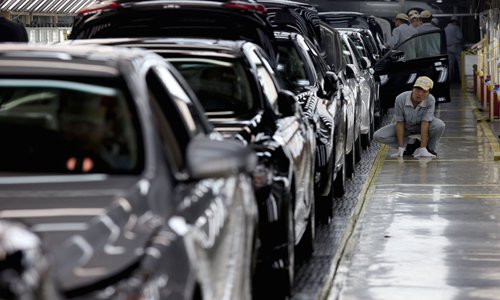China-Japan cooperation in third market key to defending free trade: analysts
Cooperation key to counter US protectionism: analysts

A view of an FAW-Toyota plant in North China's Tianjin Municipality. File photo: VCG
Chinese and Japanese companies are poised to sign dozens of business deals during the highly anticipated visit by Japanese Prime Minister Shinzo Abe to Beijing later in the week, which is expected to boost economic ties amid growing US trade protectionism, analysts said on Tuesday.
Abe is due to arrive in Beijing on Thursday to kick off a three-day visit - the first official visit by a Japanese Prime Minister in nearly seven years. The trip, coming at a time when the global economy faces great uncertainty as the US continues to take protectionist measures that have rattled global markets, could result in strengthened ties that help ease pressure from the US on Asia's two largest economies.
During the visit, the Japanese Prime Minister will meet with Chinese leaders and attend a reception to mark the 40th anniversary of the signing of the China-Japan Treaty of Peace and Friendship and a first-of-its-kind forum on China-Japan cooperation in third markets, according to Hua Chunying, a spokesperson for the Chinese Ministry of Foreign Affairs.
"China is implementing a new round of opening-up measures at the moment. This will no doubt bring many more opportunities and bigger prospects for China-Japan economic and trade cooperation," Hua told a press briefing on Tuesday.
Economic cooperation
The highlight of the trip will likely be economic cooperation deals between Chinese and Japanese companies, particularly in third markets under the Belt and Road initiative (BRI), according to Zhou Yongsheng, a professor at the China Foreign Affairs University's Institute of International Relations.
"There are dozens of contracts to be signed during Abe's visit," Zhou told the Global Times on Tuesday.
"There is huge room for bilateral cooperation under the BRI and I think the trip will expand cooperation in that regard."
Despite an earlier reluctant stance on the BRI, Japanese officials have started to warm up to the initiative, partly because Japanese companies feel they have been left out of great opportunities and have actively pursued cooperation with China.
During Abe's trip, Chinese and Japanese companies will sign several deals on cooperation in third country markets, including an urban development project in a special economic zone in Thailand, a railway project between China and Europe, and solar and wind power generation projects, according to media reports.
In a more direct move to ease pressure from the US, China and Japan will likely sign a currency swap deal worth as much as 200 billion yuan ($28.8 billion), according to Chen Zilei, director of the Research Center for Japanese Economics at the Shanghai University of International Business and Economics.
"This is aimed at helping Chinese and Japanese companies to deal with risks in the foreign exchange rate stemming from the US' protectionist actions," Chen told the Global Times on Tuesday, adding that China and Japan are jointly exploring third country markets, which is very important in defending economic globalization.
Both China and Japan have been targeted by US tariffs.
The tariffs have created an opportunity for the world's second-largest and third-largest economies to strengthen ties in defense of the global trade system, analysts said.
"The trade frictions caused by the US have highlighted the need for the two countries to expand bilateral economic cooperation," Zhou said, but added that "we shouldn't have high expectations for Japan to publicly oppose the US because Japan is a political and military ally of the US."
Chen also said that while Japan also agrees with China on the need to protect the global multilateral free trade order, the former is unlikely to make any move that would anger the US.
Abe's trip will also see other deals such as a new joint fund between Japan's Nomura Holdings and China Investment Corp that is expected to raise as much as $1 billion, according to Japanese TV network NHK on Tuesday.

